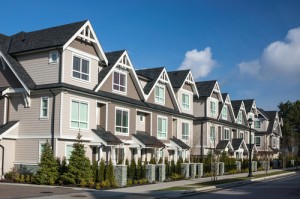Who is responsible for a fall on condominium property?
Posted September 17th, 2015 by Anthony Carbone, PC.
Categories: Personal Injury, Premises Liability, Slip and Falls.
 Jersey City and the surrounding area are bursting with condominiums. This means that there are a number of property owners joined together. They pay dues to a homeowners’ association, which is responsible for maintaining and repairing commons areas. What happens if you fall on condominium property? Does the homeowners’ association have any liability?
Jersey City and the surrounding area are bursting with condominiums. This means that there are a number of property owners joined together. They pay dues to a homeowners’ association, which is responsible for maintaining and repairing commons areas. What happens if you fall on condominium property? Does the homeowners’ association have any liability?
Condominiums and Homeowners’ Associations
We all have some idea about the concept of condominiums. Some arise from converted garden apartments or high rises. Others are townhomes or separate houses in a particular location. Basically, they give individuals the right to own individual space, while also maintaining joint ownership in the overall community.
In order to set order in the larger property, condominium owners agree to be part of a homeowners’ association. They are required to pay a certain amount in dues and adhere to the rules promulgated by the condo association. The homeowners’ association also establishes the guidelines for maintenance and repair of common areas. This could include something as simple as replacing light bulbs in common hallways. It could extend to snow removal and safety concerns at the association’s clubhouse.
Injuries on Condominium Property
Things might seem complicated if you fall on condominium property. Did you fall within a particular homeowner’s personal domain? Were your injuries related to a fault in the design or construction of the home? Or, did you fall in a common area of the property? These are all questions that an experienced personal injury attorney will consider when representing you for your accident case. It will require investigation of the circumstances, a site inspection and review of documentation.
A Recent Case Involving a Homeowners’ Association
We might not be thinking of weather related slip and fall cases right now, but the Supreme Court just ruled on a matter involving one. In Qian v. Toll Bros. Inc., No. A-95 SEPT. TERM 2013, 2015 WL 4743054, (N.J. Aug. 12, 2015), the injured party lived within the condominium complex. She slipped and fell on ice on a private sidewalk within the community. It was her contention that the homeowners’ association had a duty to maintain the private sidewalks, as they were in a common area.
In rendering its decision, the Court made the distinction between a public sidewalk and one privately owned by an individual or entity. If the fall had occurred on a public sidewalk, the homeowners’ association would have been immune from liability. The court determined that who owns or controls the sidewalk defines the distinction between private and public sidewalks. The homeowners’ association had clear rules concerning sidewalk maintenance. The Court ruled that they could be liable for injuries on the common area sidewalk.
Contact Us
In order to establish liability, it is important to seek experienced legal counsel. At the Law Offices of Anthony Carbone, we have handled personal injury lawsuits for many years. Contact us to determine how we can assist you.


